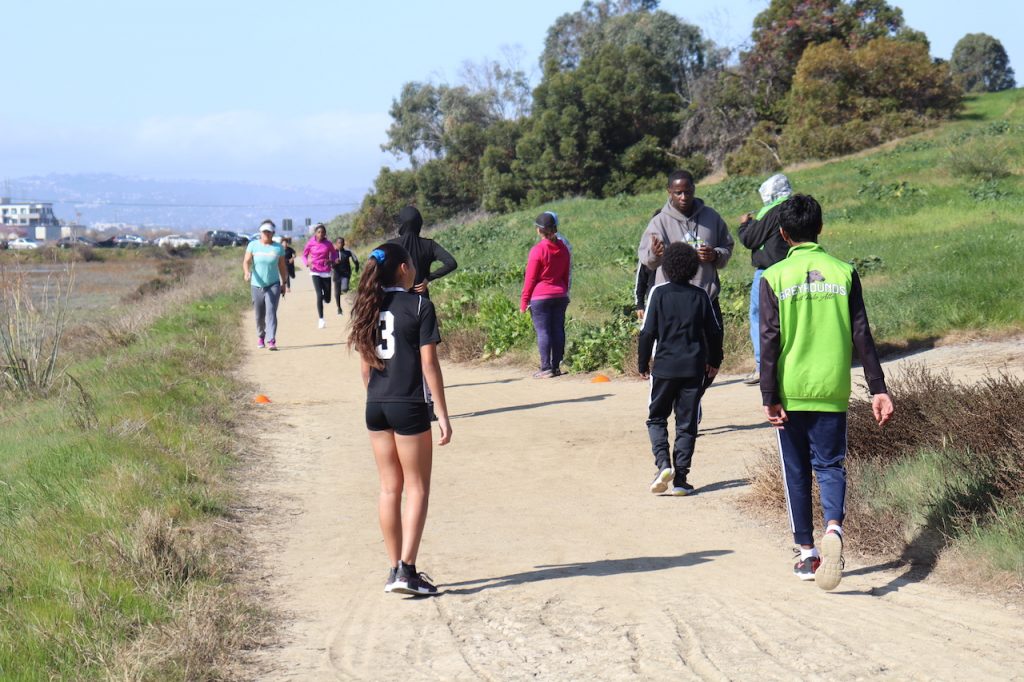
Eric “Coach E” Stuart misses the rich culture he enjoyed growing up in East Palo Alto in the ’80s and ’90s.
He misses the Juneteenth festival at Bell Street Park where the black community gathered for food and entertainment: jazz, blues, gospel, R&B. He said rapper MC Hammer even performed one time.
He misses the Friday night basketball games at the Onetta Harris Community Center in Menlo Park, a facility that still serves residents of the Belle Haven neighborhood and East Palo Alto. He misses the house parties and talent shows where he and his twin sister would perform as rappers.
Now, many of the folks he grew up with have moved away to more affordable cities. Despite the proximity of Silicon Valley mega-companies like Facebook, whose buildings now neighbor the community center Stuart grew up in, East Palo Alto has not equally enjoyed the region’s wealth. Income inequality persists: East Palo Alto’s median household income was $64,794 in 2018, less than half of Palo Alto’s $157,120, according to census data.
“You can buy houses, you can move in and we will accept you,” Stuart, 42, said. “But we don’t want you to take away our culture.”
The black population in East Palo Alto declined from 23 percent in 2000 to 11 percent in 2018, according to the U.S. Census Bureau, changing the cultural demographic of the city, which is now 62 percent Hispanic.
Stuart has seven siblings and he’s the only one who has stayed in East Palo Alto.
In 2005, Stuart founded the East Palo Alto Greyhounds, a “one-stop shop” sports club for youth of all ages, according to Erica Stuart, his wife and executive assistant of the club.
It is Stuart’s way of giving back to the community that shaped him, while holding on to their culture.
“We’re trying to keep the little that we have,” he said. “We invite people in as long as you accept our culture. I don’t think the program will be good for you if you didn’t accept that we were going to invite you to the barbecue.”
It takes a village
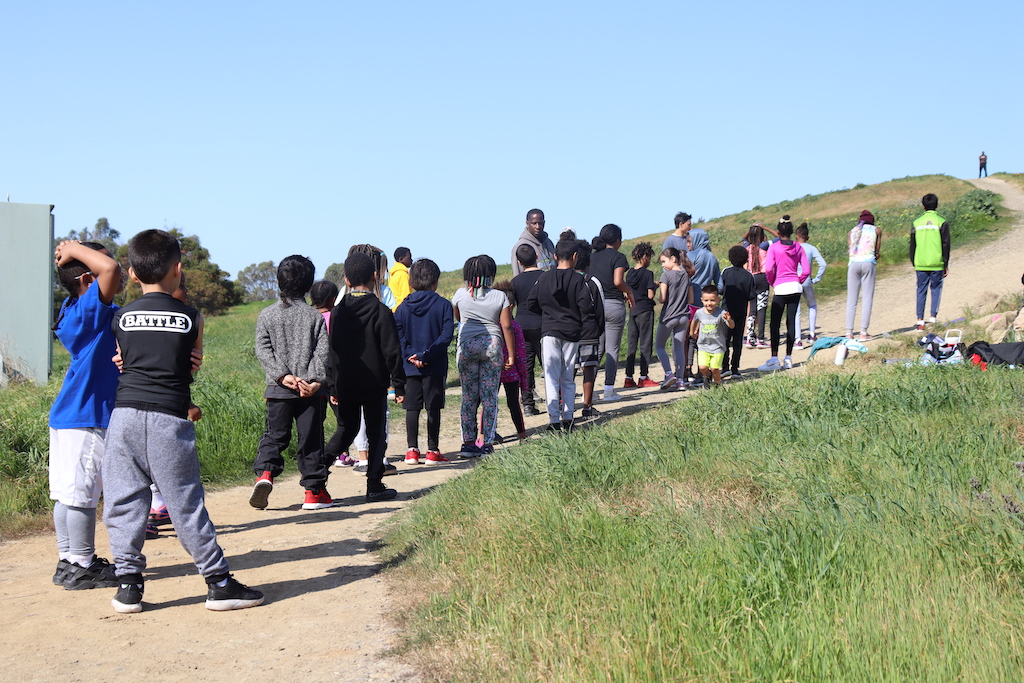
Stuart grew up in a time when East Palo Alto was known for its violence and drugs. The community has long shed this reputation, but back in 1992, the city had the highest per capita murder rate in the country, 42 murders that year in a city of 24,000. Stuart was in eighth grade at the time.
The community was a little rough, Stuart said, but the drug dealers were also the ones who made it safe for him to walk to the bus stop, get to school, and play sports at the Community Center.
“To me, it was always the safest place to be,” Stuart said. “I would rather be here than in Hollywood or Beverly Hills because I knew people here.”
After studying on a track scholarship at California State University, Long Beach, Stuart returned to East Palo Alto and started The Greyhounds with a $10,000 donation from two donors he met at the Bing Nursery School where he taught preschool.
The club creates opportunities for youth ages four through 18 to compete, build discipline, travel and earn track scholarships. Stuart felt that he owed it to the people of the community who took care of him.
The Greyhounds welcome everyone to gather in the name of sports and fun, year-round. They offer football and cheerleading in the fall, then track and field in the spring, culminating in the USA Track and Field (USATF) Junior Olympics in the summer.
They often travel to meets – to Modesto, Reno, Hercules, Antioch, Richmond – and last year sent 25 athletes to the Junior Olympics in Sacramento. But the Junior Olympics are held in a different state from year to year, generating travel costs for parents.
When Shareika Robinson’s daughter Brooklynn qualified for the Junior Olympics in 2017 at just eight years old, Shareika set up a GoFundMe page. They met their $2,100 goal and Brooklynn was off to Lawrence, Kan. She came home with the women’s under-8 long jump title – and a personal record.
In addition to the $150 annual membership fee – which goes to the club but not the club’s seven volunteer coaches – the Greyhounds rely on city grants and their own fundraising. Parents sell snacks and raffle tickets and host events like paint nights, hoping to raise enough money to cover travel costs for meets.
Before the COVID-19 pandemic hit, the Greyhounds had set their sights once more on the now cancelled Junior Olympics, which would have been held in Jacksonville, Fla. this year.
East Palo Alto doesn’t have its own track – Erica Stuart said the one at Kelly Park, located next to the Onetta Harris Community Center, is an unregulated 500 meters, unsuitable for getting a real sense of track and field. The Greyhounds had been practicing twice weekly at Menlo-Atherton High School and on Saturdays at the Bedwell Bayfront Park.
Back in February, while their children’s small feet pounded the track during a practice at Menlo-Atherton High, parents – mostly moms – sat at the sidelines.
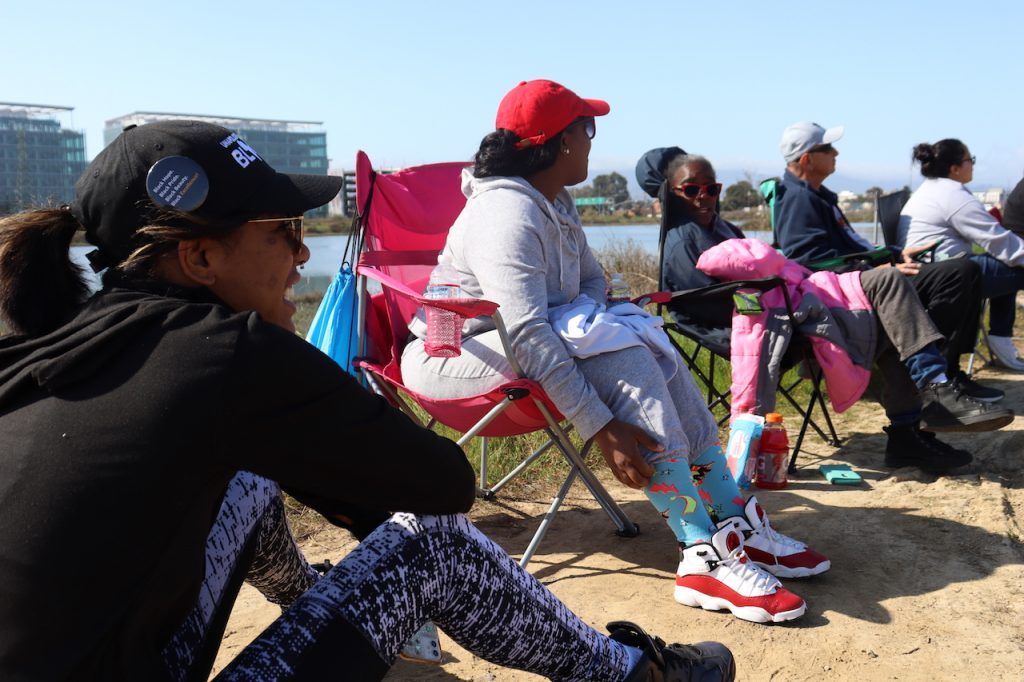
They perched in folding chairs behind the waist-high chain link fence bordering the track. Huddling under blankets, sipping hot drinks, they watched their kids train. The coaches sometimes split the children into groups. That day, the older athletes ran up and down stairs on the opposite side of the track while the youngsters practiced on the football field.
The coaches run a tight ship. The four-year-olds follow the same rules as the 18-year-olds and the coaches hold them to the same high standard. They push the athletes to succeed, and encourage them with love.
“I don’t know how he gets those kids to do what they do,” Erica Stuart said about her husband. “I don’t have that kind of magic, but he does. And they all love him.”
“If he gets in trouble, we tell him we’ll tell Coach E, and that’s more effective than me disciplining him,” Quam Erogbogbo said about his son Moyo, who turned 12 in March. “[Track] is all [Moyo] cares about, besides video games.”
Despite the painful Osgood-Schlatter lump in his knee, Moyo, the team’s captain, came out to the Saturday practice at Bedwell Bayfront Park to support the team, watching as his peers raced on the hills above him, and joining the post-workout chant: “Pain is temporary, pride is forever!”
“It’s like a family,” said Robinson, Brooklynn’s mom. “Track meets are like a family picnic.”
At the meets, parents bring their canopies, chairs, coolers, food and sometimes even music. They laugh and cheer for the kids. It’s like a Greyhound family kickback.
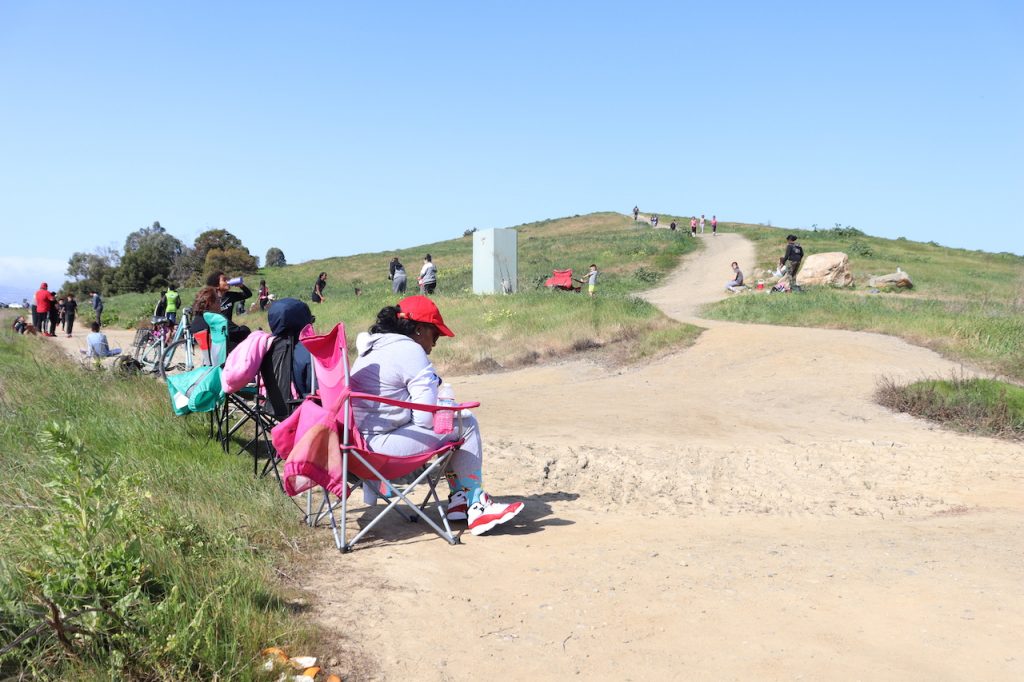
During practice, some parents cheer like it’s a competition.
“Get up there Maliyah!” Davena Patton shouted as her eight-year-old daughter sped down a dirt trail during a Saturday practice. “Catch her! Go!”
Off the track, Patton motivates her daughter by teaching her about black historical figures.
“I told her ‘Guess who made the traffic lights?’” said Patton. The answer is Garrett Morgan, a black inventor who patented the first three-position traffic signal in 1923. “Guess who made the peanut butter? Look him up. He’s a black guy.”
Then, leaning in, her voice dropping to a whisper, she talked about how slavery tried to take away black people’s dignity and make them feel like nobody.
“But we’re fighting. We fight, we fight, we fight,” she said.
Patton hopes her daughter “goes all the way” with track as it can land her a full scholarship for college, like some of the club’s past members.
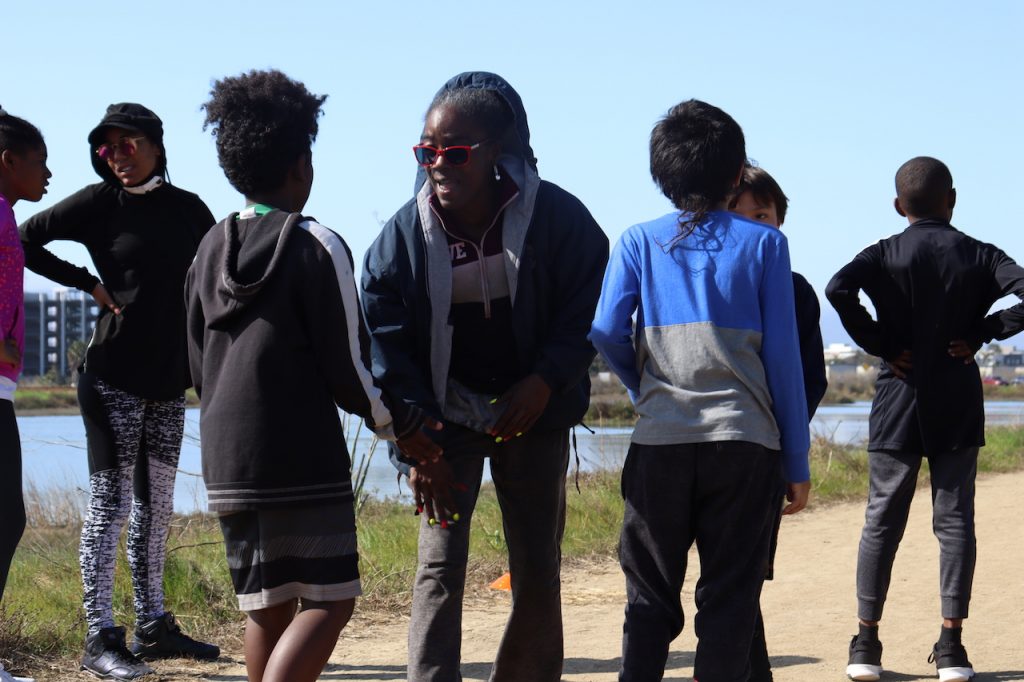
Passing on the torch
“I love the club. That’s why I’m still here,” said Keianna Talton during a February practice at Menlo-Atherton High, while her 12-year-old daughter Keiniyah trained on the field.
Talton grew up running track in East Palo Alto, coached by her dad, Will, one of the seven Greyhound coaches who now coaches her daughter, too.
“I lived and died track. I breathed it. It was everything to me,” said Talton, who continued competing at 19, while six months pregnant with Keiniyah. She ultimately gave up track to focus on motherhood.
Though she misses track, she never forced her kids to join the sport. Keiniyah joined of her own volition.
“It’s so cute to me that she never said she wants to be like me, but she shows it because she’s always trying to beat times that I ran,” Talton said.
In its fifteenth year, the Greyhounds’ ties to East Palo Alto are firmly rooted, with one generation ready to pass the torch to the next.
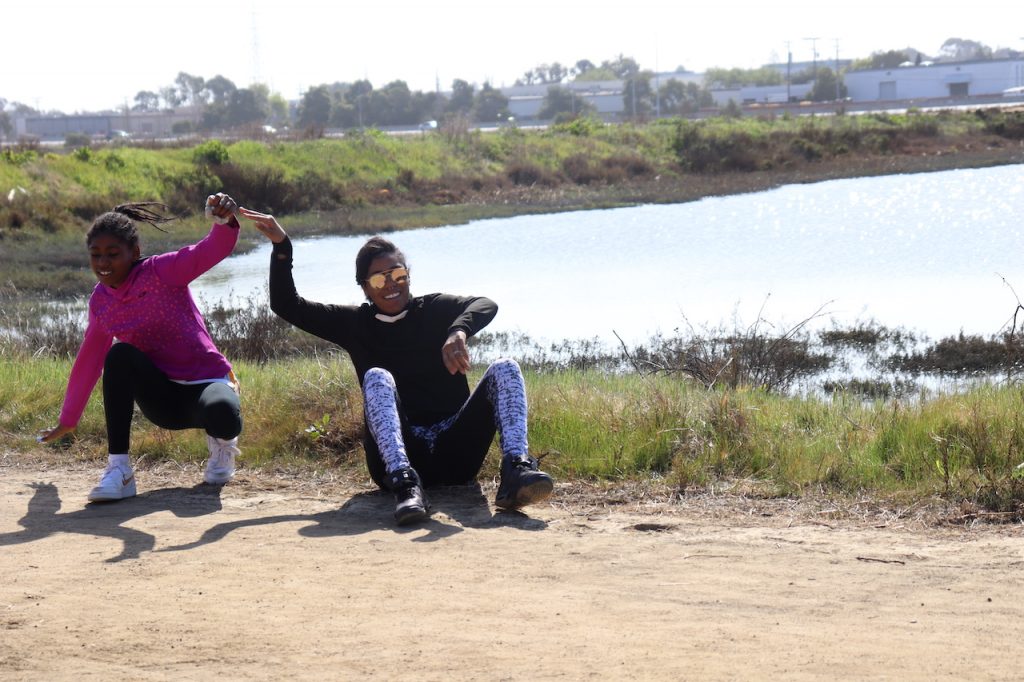
“It’s a small city and the kids can go almost anywhere they want, but we want to keep them inside,” said Andre “Coach Country” Pruitt, athletic director of the Boys and Girls Club of the Peninsula. Pruitt coaches basketball and soccer, and said he learned a lot from Stuart about how to keep East Palto’s kids in sports.
Pruitt moved from Memphis, Tenn. nine years ago, and his southern accent earned him the nickname “Coach Country”. He loves East Palo Alto; it reminds him of home.
“I love the grind,” Pruitt said. “People here work. They work to maintain what they have. They work hard to keep their families together.”
He admires the work that Stuart and other coaches are doing to keep the community’s kids engaged. Pruitt believes sports foster relationships that could keep the community’s kids – like Brooklynn, Maliyah, Moyo and Keiniyah – together for life.
And Eric Stuart will never forget the people his community has lost.
Some of them have moved away. Some are incarcerated. Some have died.
“In their memory,” Stuart said, “I kind of hope they’re looking down on me right now and they’re like ‘Thank you, my brother.’”
A season cut short
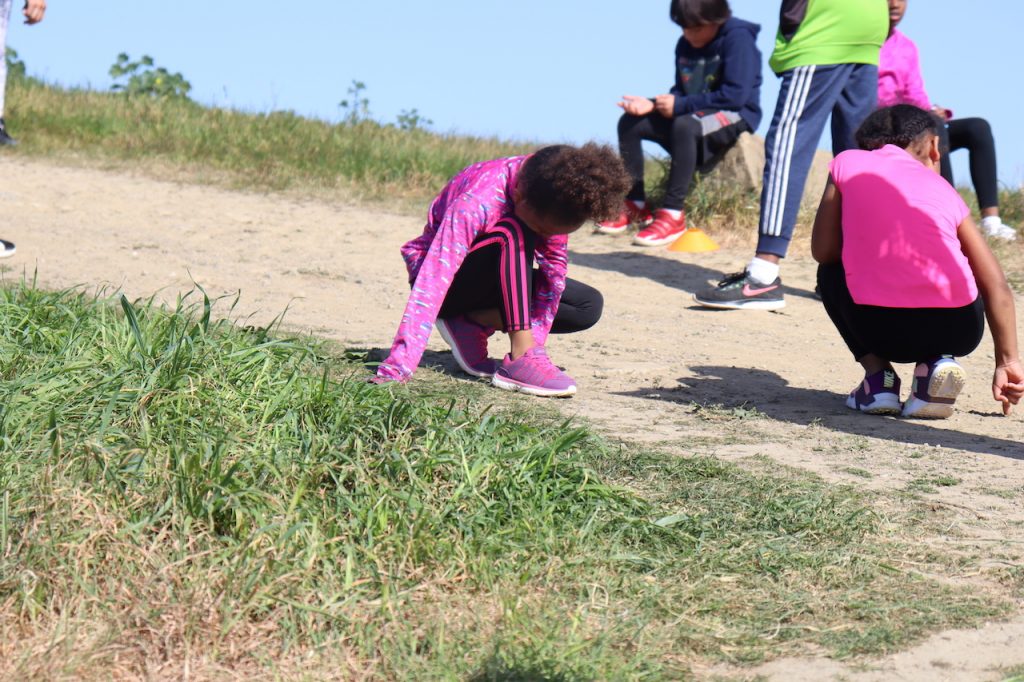
Now, practices are on pause due to the COVID-19 pandemic. The team had only competed at one track meet the weekend of March 7. Less than two weeks later, San Mateo County ordered residents to shelter in place. The USATF Junior Olympics, set for July 27 to August 2 this year, have been cancelled.
Stuart said they probably won’t resume practice this year, and will set their sights on next year’s season instead. Meanwhile, he’s learning technical training skills from his college teammate Gary Cablayan and protesting racial injustice along with the rest of the country.
In early June, Stuart and some of the athletes joined the Black Lives Matter protest in East Palo Alto, which was organized by Menlo-Atherton High School student Alanna Stevenson. Stuart said a group of about 17 athletes gathered at his home in East Palo Alto, and they joined the peaceful protest together. Afterwards, they talked about what had happened. Stuart said some of the athletes were emotional.
They’ve had conversations about race in the past. When they travel for track meets, it’s with the knowledge that they may get treated differently because of the color of their skin. Many of the Greyhound athletes are Black or Latino.
Stuart recalled a moment when the team was eating at a Waffle House restaurant in Florida – where they had travelled for a track meet – and they saw a white man pull up to the restaurant in a red truck with a confederate flag on the side of it.
“Some of my older students knew exactly what that was. So they start going, ‘Oh wow, oh my god’. Of course the younger athletes who have no idea what a confederate flag is [were] like ‘Well what’s wrong? What is that?’ So they have to educate each other, right. We have to educate each other,” Stuart said.
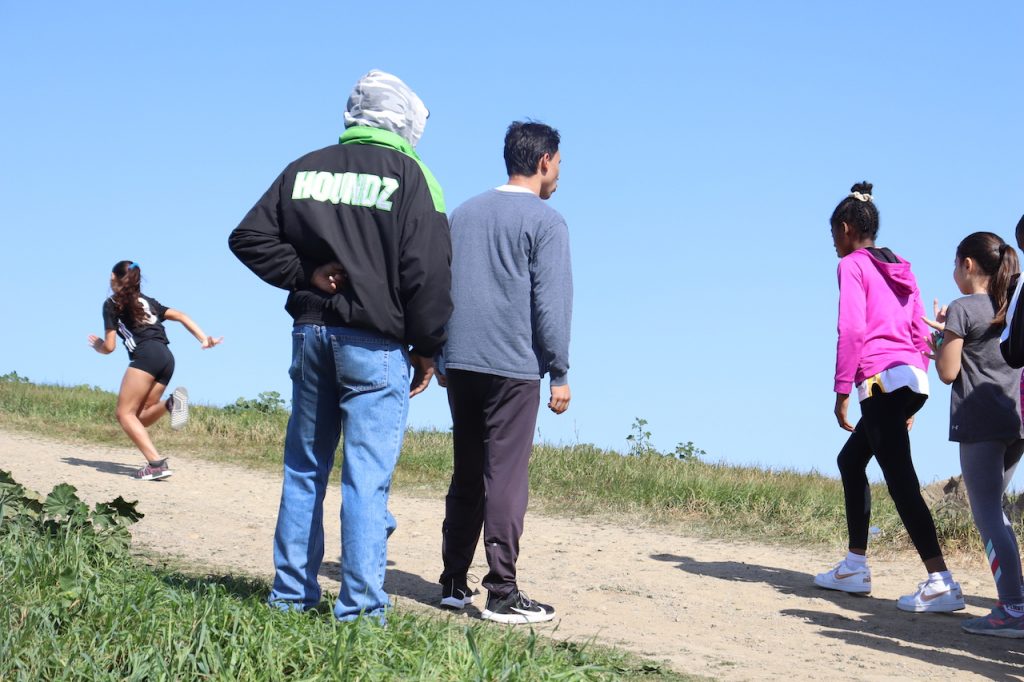
Reporter’s note: Most of this story was reported in February 2020, before San Mateo County was required to shelter in place due to the COVID-19 pandemic.
